News
Murat Uysal, President of Central Bank of Turkish Republic Appeared as a Guest on ICI November Assembly
- 27.11.2019
- News
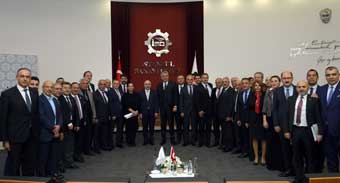
Istanbul Chamber of Industry (ICI) November ordinary Assembly meeting was held on 27 November 2019 in Odakule Fazıl Zobu Assembly Hall with the main agenda of “The Importance of Financial Policies and Price Stability for Qualified and Sustainable Production Economy”. Murat Uysal, President of Central Bank of Turkish Republic appeared as a guest in the meeting directed by Zeynep Bodur Okyay, ICI Assembly Chairperson.
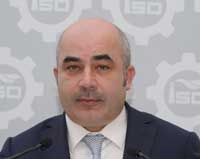
Murat Uysal President of
Central Bank of Turkish Republic
Stating that they have increased the share out of the trade of world goods and services thanks to the contributions of gains in competition capacity in the recent years in his speech towards the assembly members, Uysal informed that Central Bank of Turkish Republic supports the process by providing credit finance for the exporters through Turkish Eximbank and the commercial banks. Uysal said that “The cycle of growth-current deficit-capital outflow-shrinkage experienced in open economies which have high import input and saving deficit through the efficiency and production with high added value. We will continue to support real sector in financial risk management and access to credit by using macro prudential instruments such as required reserves in an effective and efficient way in the following period.”
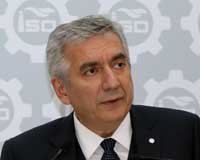
ICI President Erdal Bahçıvan
By drawing attention that the most important fragility in finance of real sector is the currency debt and the balance risk created by that currency debt, Erdal Bahçıvan, President of Board of Dırectors of Istanbul Chamber of Industry said that: “Industrialists have become indebted to foreign currency not because they have wanted but because they could not find credit in TRY with reasonable cost. We directly carry the currency risk today. An encouraging model should be presented for converting high currency debts into TRY.”
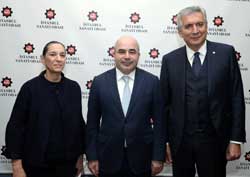
Stating that a healthy and efficient credit allocation mechanism application which prioritizes the production should be awarded with policies of Central Bank, Bahçıvan recommended that required reserve ratios should be determined by taking into consideration the growth speed in credits for the real sector investments. Bahçıvan said that: “Türkiye should end searches for growth with doping impact which brings crisis together with itself. Instead of a high, unhealthy and unrealistic growth, we would rather Türkiye to experience a healthy, qualified and sustainable growth.”
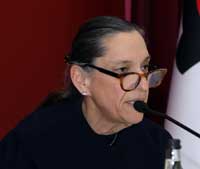
Zeynep Bodur Okyay
ICI Assembly Chairperson
ICI October ordinary Assembly meeting was opened by ICI Assembly President Zeynep Bodur Okyay. While launching the meeting, Okyay briefly mentioned that:
“It is not possible for non-productive economies to ensure prosperity increase. As we have always said, the industry will have a key role in our economy’s gaining a strong growth speed again. The industry manufactures and provides a constant prosperity. Regardless of their current successes, any monetary and financial policy which cannot meet the needs of the industry cannot create a sustainable economy. At this very point, Türkiye must dedicate its all opportunities to the establishment of the environment required for the creation of the qualified production economy and to the success of the speed which will be created by this environment. We have such a long way to go in various fields varying from making the macroeconomic stability constant, fighting against the unregistered economy in an effective way to effective tax and incentive policies on a realistic basis and production friendly finance system. Central banks of various countries throughout the world have been in a struggle for protecting the freshness of their economies since 2008 crises. Indicator interest rates are in low levels and the central banks do not have adequate amount of traditional munitions because of the interest discounts more than 700 in the last 10 years throughout the whole world. Within this environment, robust and independent stance of Central Bank is of crucial value in addition to the economy policies to be followed. As Turkish industrialists, we are in need of a Central Bank which supports the policies to pave the way for the qualified production and investments. When we look at our appearance today, we see that there is an improvement in macroeconomy; however, we have an acute problem, which is the significant time shrink for the savers and investors. The most significant reason is the high and instable inflation. There is a problem of “not being able to create an inflation” in developed countries while the developing countries have been able to get inflation rate around 3.5-4 percent on average. By this means, they can act in a more freeway in implementing monetary and financial policy. Türkiye is an exceptional country in this sense. We must delete this appearance in terms of inflation for a sustainable growth. And the only way for this is to activate a composition of discourse and action to break the inflation expectations and maintain its existence without making any sacrifice from it.”
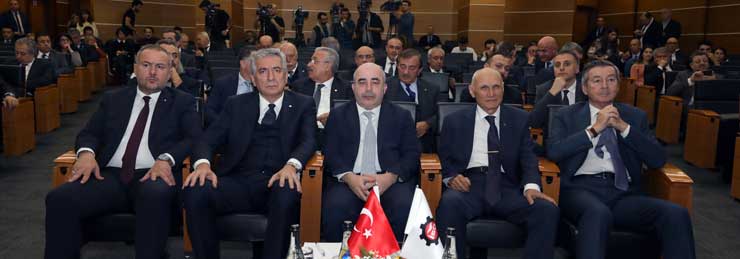
Okyay, Chairperson of ICI Assembly invited Erdal Bahçıvan, ICI President to present his speech. Bahçıvan said that borrowing is the first problem among the main problems of utmost importance for our facilities. Drawing attention that industry finance to be provided over the banking system in our country where saving rates are inadequate is very limited, Bahçıvan recorded that borrowing is getting more expensive for industrialists and it brings the additional costs such as mortgage, etc. in using credit because of this situation. Bahçıvan stated that the industrialists cannot access to the finance which they are in need both in terms of their investment activities and in other business operations through reasonable circumstances.

Explaining that one of the most important parameters which limit the finance resources of the industry is warranty-based banking approach, Bahçıvan drew attention that as industrialists, when they are intended to apply for credit for their investments, they face with warranty demands which multiply the credit amounts twice or three times in today’s world. Bahçıvan emphasized that they should move away from title and mortgage-based banking approach in a period when they aim to take a technology-based industrial step.
Pointing out that they consider KGF experience constitutes an appropriate example for them in affiliating the warranty problems, Bahçıvan added that they hope the contribution of KGF which has relieved the real sector by serving as a warranty remover will be increased in the productive investments through a qualitative transformation in the following periods.

Underlining the importance of applying a healthy and efficient credit allocation mechanism in banking system and dominating the crediting approach prioritizing the manufacture, Bahçıvan expressed that they strongly believe this approach should be supported, protected and awarded by the policies of the Central Bank.
Reminding that the Central Bank has resorted to rating system based on the credit growth speeds of the banks in specifying the required reserve ratios since August, Bahçıvan suggested to take a further step and to specify the required reserve ratios by including the credit growth speed for real sector investments.
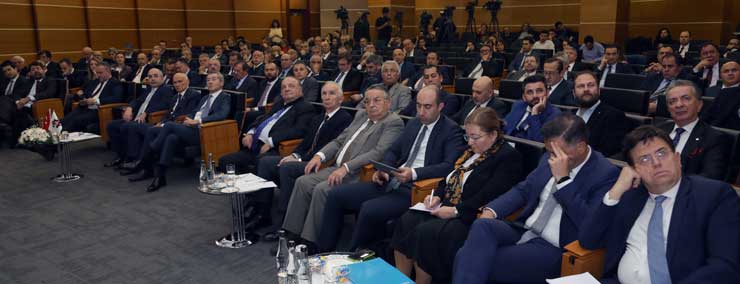
Stating that one of the fragilities of utmost significance in terms of real sector finance is currency-based debt load and balance risk caused by this debt load, Bahçıvan said that: “Firstly, I would like to express that as industrialists, we have not directed towards currency debt because of discretionary reasons. We have to direct towards the foreign resources since we could not find long-standing credit in TRY with reasonable cost. But today, we have taken upon a significantly high currency debt and exchange risk. However, we believe that we can present an encouraging model in converting high currency debts into TRY by being supported by the relatively improvement of TRY finance conditions in the economical balancing process through which we have been passing.”
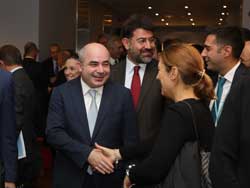
Stating that they believe excluding dollarization from their lives and generalizing the philosophy of borrowing in TRY would be beneficial, Bahçıvan expressed that it should be remembered to provide innovative supports and organize training activities in order to increase the endurance of real sector against exchange risks and to strengthen the defense mechanisms.
Bahçıvan continued:
“Türkiye should end searches for growth with doping impact which brings crisis together with itself. This situation which gets into a vicious circle causes harm on manufacture centers established through great efforts and sacrifices in Turkish economy. Besides, it creates employment loss and pave the way for waste of resource. Instead of a high, unhealthy and unrealistic growth, we would rather Türkiye to experience a healthy, qualified and sustainable growth. Therefore, we attach great importance to the dialogue of the Central Bank has established with the real sector yet and we hope this communication will pave the way for a long standing, quality and prosperous growth.”
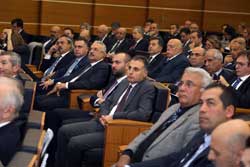
Then Murat Uysal, President of Central Bank of Turkish Republic took the rostrum. Uysal stated that current balance has witnessed a significantly high improvement in the last one year and started to have surplus since 2002 for the very first time. Reminding that they will have had current surplus in a year when a positive growth has been recorded since the end of the year based on the existing projections, Uysal recorded that stability of the gains which they have made in the foreign balance with the impact of the prudential macro policies applied within coordination have a key role in terms of price stability, financial stability and sustainable growth.
Uysal expressed that discussing the external balance dynamics together with the cyclical and structural elements in a country which have current operations deficit for long years such as Türkiye is of crucial importance for the sustainability of macroeconomic stability. Reminding that current operations deficit has been improved swiftly thanks to the balancing process commenced at the second quarter of 2018 and has had surplus on an annual basis in June of this year for the first time after long years, Uysal expressed that the improvement in the current balance has maintained its existence at the third quarter and has had surplus for 6 billion USD approximately since September.

Pointing out it has been estimated the current operations balance which has had current deficit by approximately 6,5 percent as the ratio to the national income at the second quarter of 2018 has had surplus in the rate of 1 percent approximately since the third quarter of 2019, Uysal explained that the current operations balance had surplus on annual basis in November of 2002 following one of the most intense crises throughout our history and it continued to have a constant deficit since that period until June of 2019.
11 no - Mentioning about the close relation between growth and import in Türkiye based on the manufacture structure, Uysal said that improvements in current deficit match with the periods when the economical operations got significantly weak on historical basis. However, drawing attention that the balancing process in the recent period includes distinctive characteristics when compared to the previous periods, Uysal underlined that the rectification experienced in current balance in the current period has realized in a healthier way compared to the 2001 and 2009 crises where the economy shrank in a sharp manner. Uysal drew attention that the point where they have had current surplus in a period when slowdown in economic operations are relatively limited points out to a transformation beyond the circular impacts.

Uysal said that: “We have realized various rectifications on increasing limits in export rediscount credits, expanding the credit scope and providing ease of use. We will continue to support real sector in terms of risk management and access to credit by using the macro prudential instruments such as required reserves apart from our financial architectural researches which we are conducting for the protection of assets in TRY against risk and for their pricing activities. Besides realizing such formations required in such fields within the framework of instrument set which we possess without any delay, supporting such policies through structural steps to enable the improvement in the current balance to be permanent is of vital importance.”
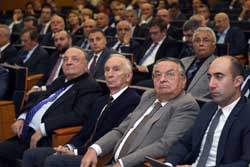
Stating that while using their instruments based on price stability as the Central Bank of Turkish Republic, they take into consideration the reflections of external balance on the macrofinancial stability, Uysal mentioned that they have adopted a policy framework where the macro prudential instruments such as required reserve are used effectively for the healthy growth in terms of increase speed, composition and sectoral distribution of credits.
Uysal continued: “Our firms have achieved success in new markets especially defense industry, chemistry, furniture and construction sub-industry sectors in addition to the traditional exporting sectors in this process. Getting into the new markets provides contribution for our export composition to be diversified and intensified. We have witnessed that great increases realize in the local content of the manufacture in sectors such as defense industry, textile, machinery-equipment, fabrication, metal, medicine, chemistry and energy in recent years and we are aware that we still have a long way to go in such fields. There is no doubt that policy steps to be taken in order to decrease the imported input rate of the manufacture will provide significantly comprehensive contribution to directing the economy to a balanced and sustainable growth route.
ICI Assembly Members taking to the rostrum after the speech of Uysal shared their opinions regarding the agenda. Uysal answered the questions of Assembly Members.
